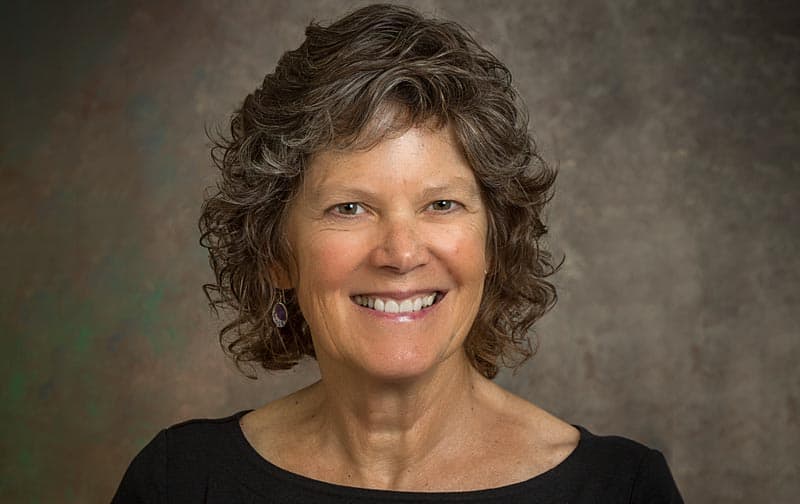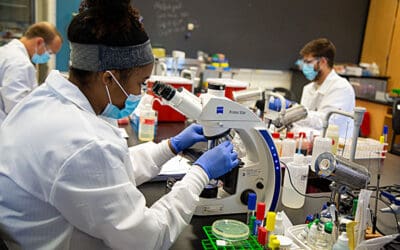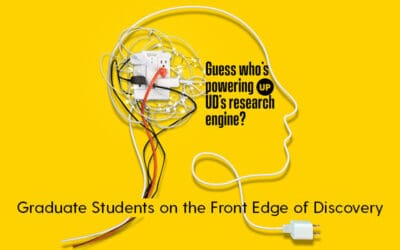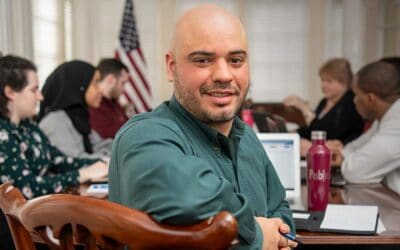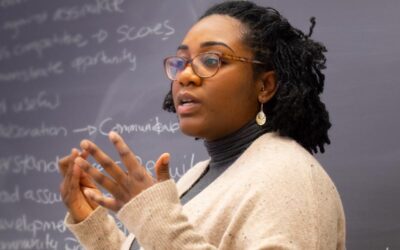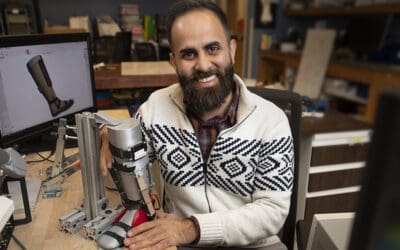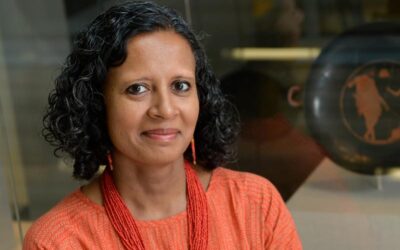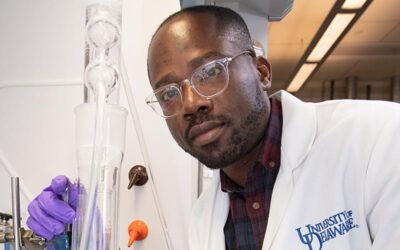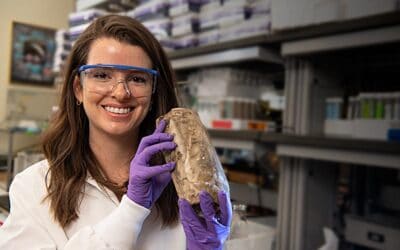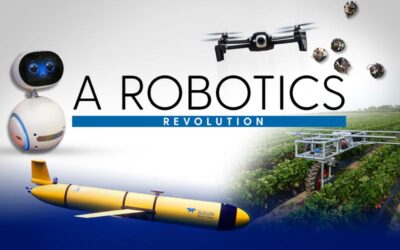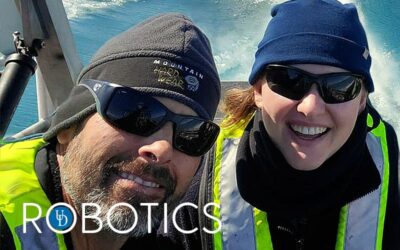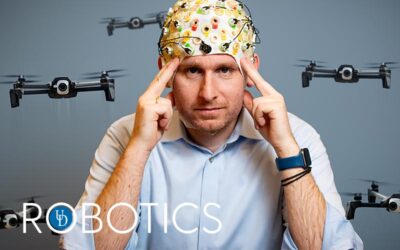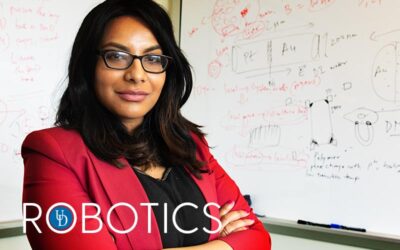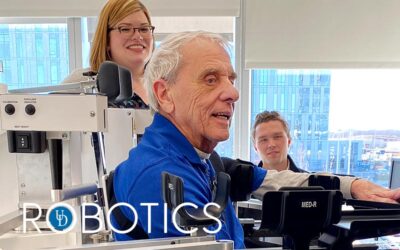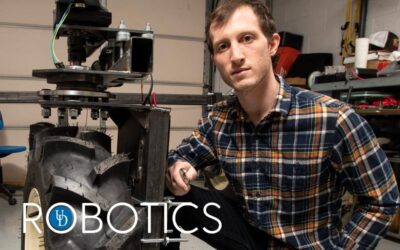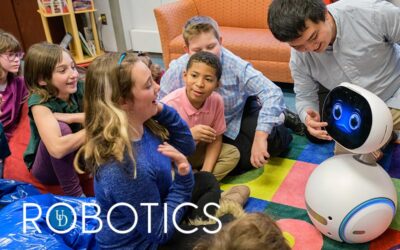Psychological & Brain Sciences
GRAD STUDENTS ON THE FRONT EDGE OF DISCOVERY
Alexandra “Lexie” Tabachnick is a fifth-year doctoral student, collecting and analyzing data to study the impact a University of Delaware-developed intervention program has on vulnerable children.
Pre-pandemic photo by Evan Krape
Psychological & Brain Sciences
GRAD STUDENTS ON THE FRONT EDGE OF DISCOVERY
Alexandra “Lexie” Tabachnick is a fifth-year doctoral student, collecting and analyzing data to study the impact a University of Delaware-developed intervention program has on vulnerable children.
A clinical science approach
by Beth Miller
Alexandra “Lexie” Tabachnick wasn’t looking for a path to research when she was scouting around for a doctoral program in psychology. She wanted to be a clinician doing practical, hands-on stuff.
But friends suggested she check out the work underway at the University of Delaware — especially that of Mary Dozier, Amy Elizabeth du Pont Chair of Developmental Psychology. She took their advice.
“It wasn’t until I was interviewing with Mary that I saw the value of the clinical science approach,” she said. “It was eye-opening.”
That approach applies the power of data and scientific research to the intractable problems people face, problems that can consume lives and futures.
Now she collects and analyzes psychophysiological data to study the impact Dozier’s Attachment and Biobehavioral Catch-Up (ABC) program is having on vulnerable children.
Tabachnick, in her fifth year of doctoral studies, is also helping to mentor other grad students and some of the more than 40 undergraduates who are part of Dozier’s lab.
The ABC intervention aims to strengthen bonds between parents and vulnerable children, some of whom have been adopted internationally, born to mothers dependent on substances like opioids, mistreated and/or neglected.
Dozier’s research has drawn expansive support and recognition, including a lifetime achievement award in 2019 from the American Psychological Association, and now includes adolescent children who started the program as infants. Tabachnick and others are analyzing biomarkers in these children, seeing if and how the program’s effects continue as the children grow older.
In 10 one-hour sessions, Dozier’s ABC intervention helps parents develop nurturing bonds with children and the science shows the work is paying off.
In her work, Tabachnick looks specifically at autonomic regulation — instinctive responses — by studying such biomarkers as heart rates and heart-rate variability present in children facing various situations.
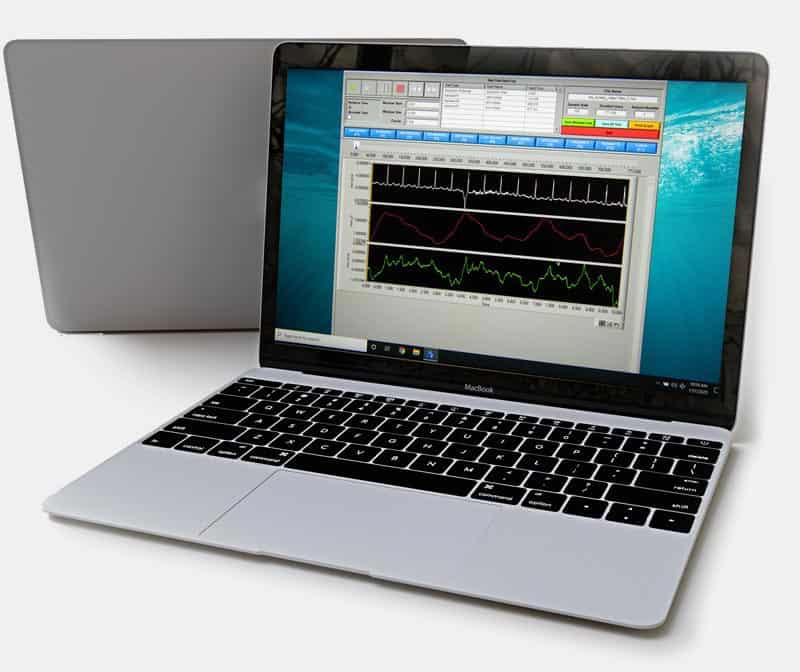
Studies have shown that children with secure attachments enjoy many benefits throughout life — social, cognitive and physical. Poor attachments, on the other hand, are associated with depression, anxiety, impulsivity, attention problems and aggression.
— MARY DOZIER
What are Biomarkers?
Instinctive responses may be misinterpreted by parents, who sometimes respond in ways that further frighten their children. For example, infants withdraw when they are stressed or confused by a situation. They may turn away from a parent, who may then interpret that action as rejection. What the child needs most is nurturance, but a parent who does not understand that or does not know how to provide that nurturance could respond with resentment and make things worse instead of better.
There are no typical days in this work, Tabachnick said, but there is plenty of work to do. There are clinical practice requirements, family visits, data collection duties, meetings with undergraduate students, training sessions, department meetings, lab meetings, classes and lots of writing. And there is an unending demand for scheduling and rescheduling family visits and sessions.
Families have complicated lives and many parents juggle multiple stressors. Tabachnick is excited to see avenues of research opening up around diverse family situations, not just the high-income, middle-class white families that have more often been the focus of research.
“Groups are different,” she said. “And I am excited about challenging assumptions that we know things. If we haven’t done the research in diverse populations, we don’t know…. One thing I have learned is how important it is to have multiple sources of information.”
Tabachnick was born in Philadelphia, the first of three children. Her mother is a preschool teacher, her father is in historic preservation. She earned her bachelor’s degree in psychology at the University of Chicago and her master’s at Villanova University, where she studied risk and resilience in families who were homeless.
She is pursuing a clinical internship, confident that UD’s program has equipped her with both clinical and scientific expertise.
“I am in the right place at the right time with the right person,” she said. “And I am grateful.”
“It wasn’t until I was interviewing with Mary that I saw the value of the clinical science approach.”
— Lexie Tabachnick
Mary Dozier, Unidel Amy Elizabeth du Pont Chair in Child Development, and members of her lab study the development of young children who have experienced adversity. Together they have developed an evidence-based intervention called Attachment and Biobehavioral Catch-up (ABC), designed to enhance attachment and help children regulate their behavior, emotions and physiology. Pre-pandemic photo by Evan Krape
Get to know our grad students
This special section of our digital magazine highlights a powerful force behind UD’s research engine.
MORE STORIES
From the Vice President for Research, Scholarship and Innovation: Moving Forward
The UD research community continues to navigate COVID-19, with health and safety the highest priority. In spite of hardships, we’re facing the pandemic with vigilance and resilience.
News Briefs
Check out our COVID-19 research, a virtual visit with the editor-in-chief of Science, and undergrads at work on the Frontiers of Discovery.
Honors: Celebrating Excellence
UD faculty and students have won major recognition for their expertise and contributions.
Guess Who’s Powering Up UD’s Research Engine?
This issue of the University of Delaware Research magazine introduces you to a critical creative force at UD — our graduate students and postdoctoral researchers. Their ingenuity is lighting new routes to discovery and solutions.
Front Edge of Discovery: Strengthening democracy for a better world
It all began with a Joseph Conrad novel. Doctoral student Pablo McConnie-Saad discusses his journey to better understand democracy, as the first Whittington Graduate Fellow at the Biden Institute.
Front Edge of Discovery: Developing resilient Black girls
Doctoral student and Graduate Scholar Nefetaria Yates is examining school discipline and the tactics Black girls have developed for dealing with the pressures they face. Her ultimate goal is to elevate voices that have been silenced.
Front Edge of Discovery: Helping children move
Entrepreneur Ahad Behboodi wants to see kids with cerebral palsy move more freely. He plans to commercialize a robotic foot device with the power to help them.
Front Edge of Discovery: Beyond the hands of a potter
Sanchita Balachandran, associate director of Johns Hopkins Archaeological Museum and doctoral student in preservation studies at UD, is uncovering the forgotten makers of ancient Greek ceramics, and in so doing, changing our understanding of the past.
Front Edge of Discovery: Changing the world, one food waste at a time
Elvis Ebikade thinks potato peels hold a lot of promise. He’s working on converting the food waste to valuable chemicals and fuels that can power an environmentally-friendly future.
Front Edge of Discovery: The thing about permafrost is…
As a postdoctoral researcher, Liz Coward collected samples of permafrost from the icy walls of a research tunnel in Alaska to study the carbon stored within it.
A Robotics Revolution
Researchers at the University of Delaware are leveraging robotic systems to gain traction on tough problems. Learn how they are driving forward transformative solutions in agriculture, precision medicine, health care, cybersecurity, marine ecology and more.
UD Robotics: Antarctic food webs
University of Delaware researchers Matthew Oliver and Katherine Hudson think that some biological hotspots in Antarctica may operate less like local farms and more like grocery stores. If they are correct, it could provide new information about how this ecosystem will be affected under climate change.
UD Robotics: Robots these days!
Brain-swarm technology is meant to connect minds and machines. For Associate Professor Panos Artemiadis such robotics research has one purpose: To make life and work better for humans.
UD Robotics: Meet me on the cutting edge
Sambeeta Das is forging into an exciting world you can see only with high-powered microscopes, where sci-fi meets reality. Welcome to the world of microrobots!
UD Robotics: Allies in Overcoming Stroke
Stroke is a leading cause of long-term disability, but UD Professor Jennifer Semrau is working to change that. With the help of a robot, she’s uncovering a critical sixth sense that gets sidelined with stroke.
UD Robotics: Startup with Roots
Adam Stager is working on chemical-free ways to help strawberry farmers improve yield using an autonomous field robot.
UD Robotics: Social Robots
Children have grown up with interactive technologies like Siri, Google and Alexa, but they don’t always know how to stay safe online. UD researchers are working on ways to help them.
A Jewish Oral History
A class helps preserve the precious stories of a little-documented time in Jewish life.
Test Your Knowledge: Getting Back to Nature
To reduce stress and strengthen our immune systems, experts often point us to the outdoors. So let’s get moving! There’s lots to see and hear, absorb and appreciate in nature.


